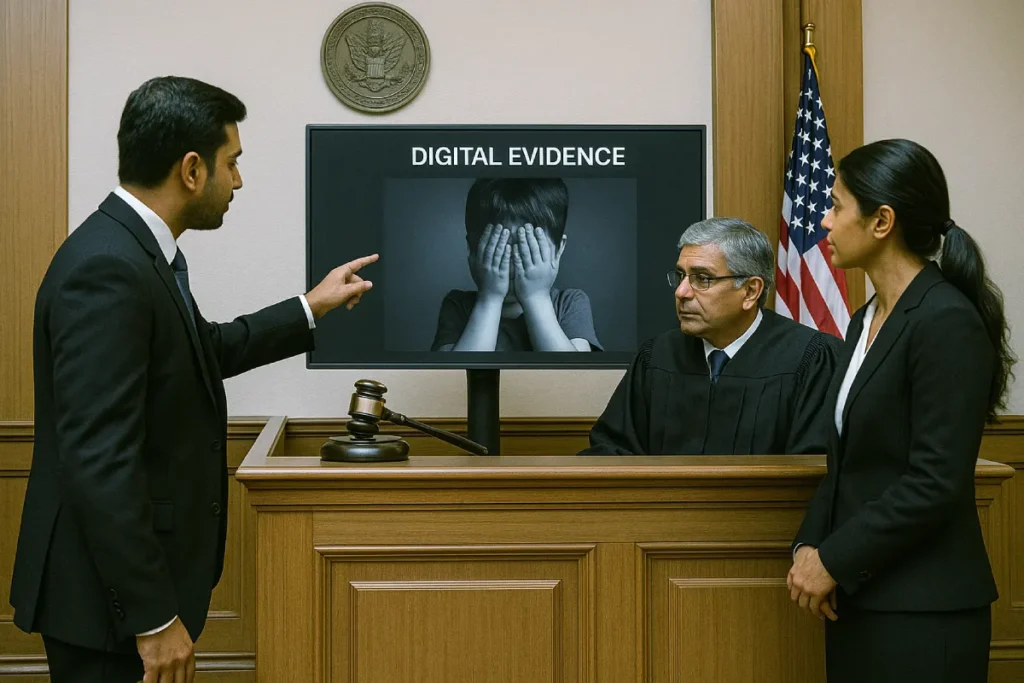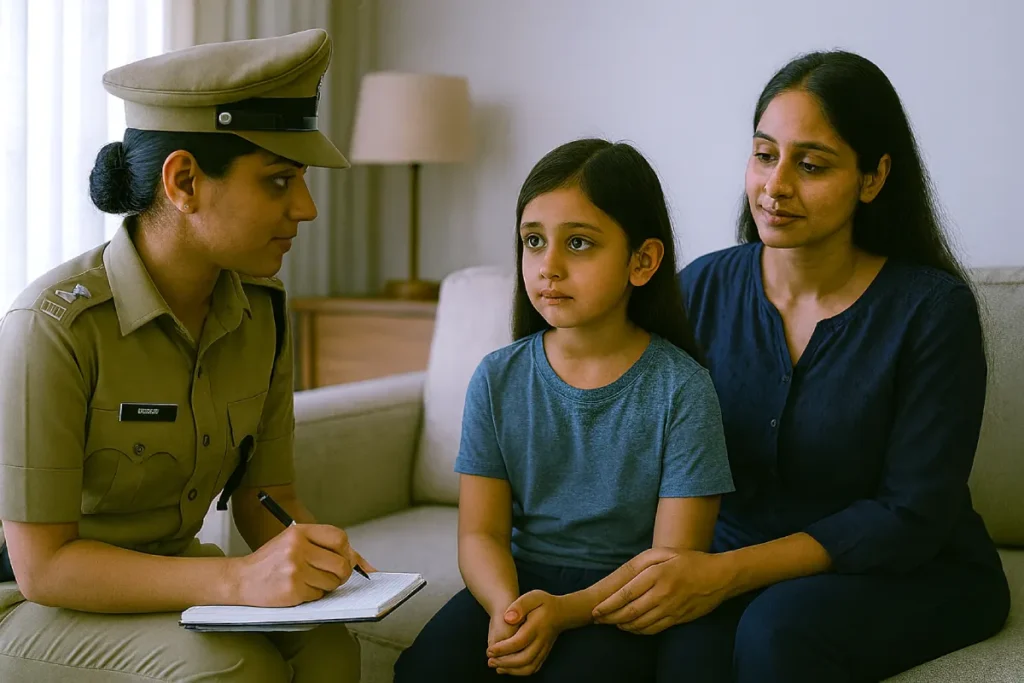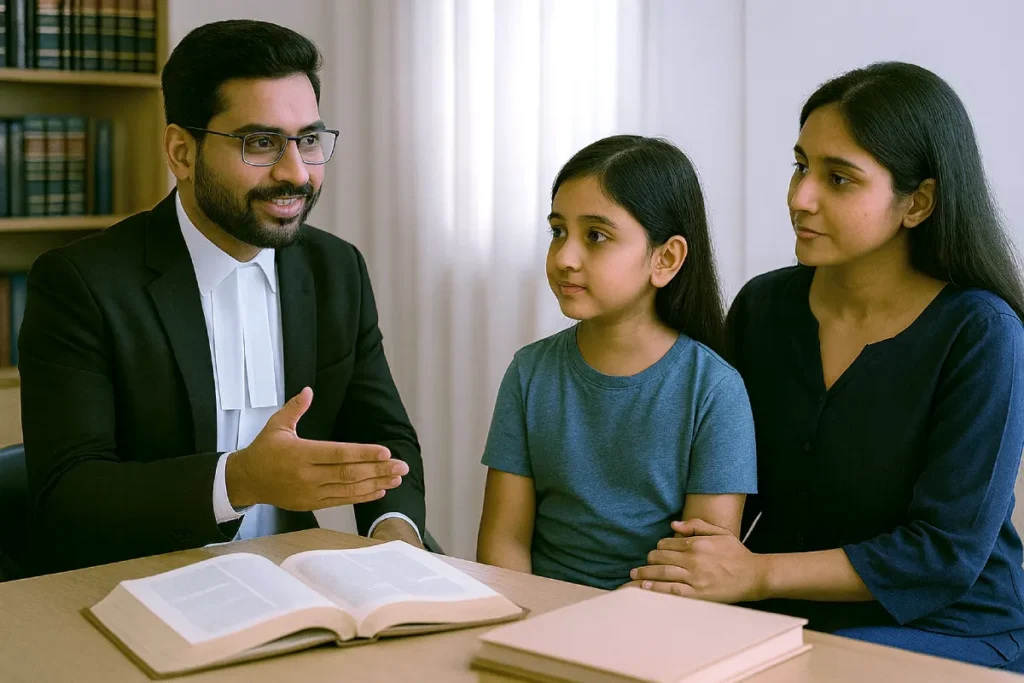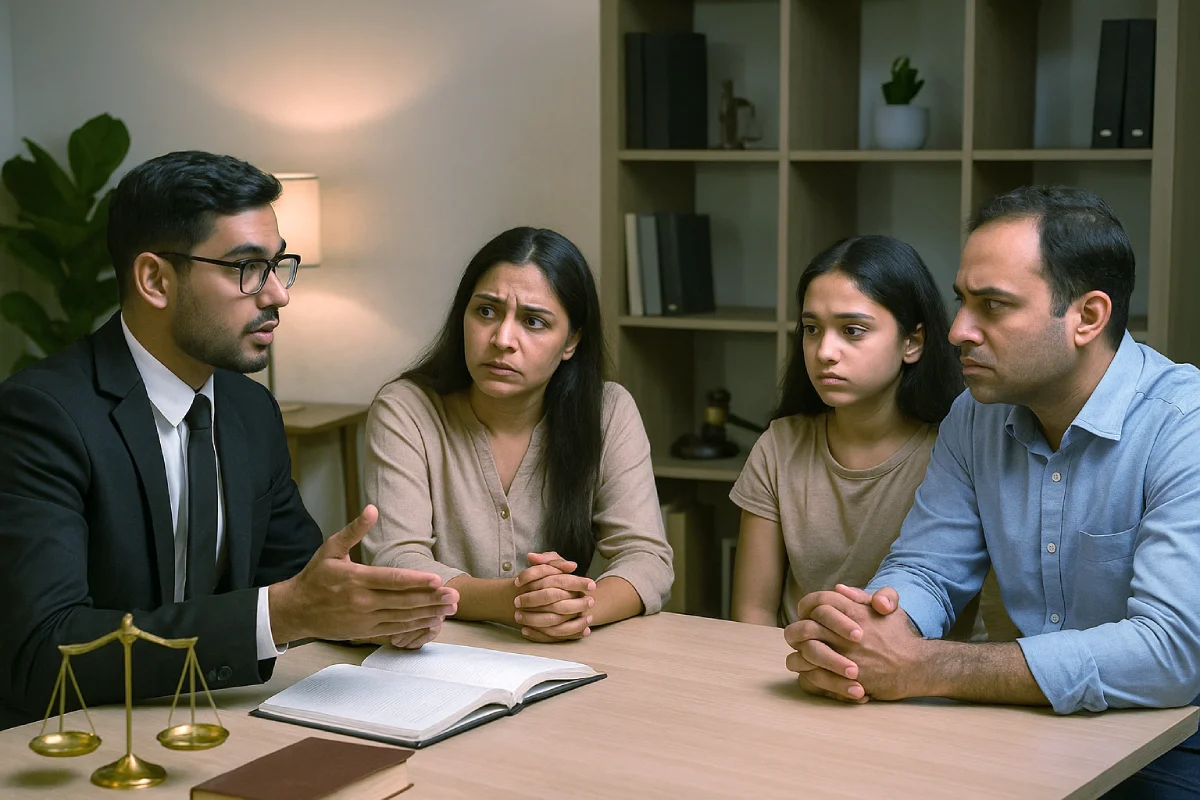What is POCSO Act? – A Complete Legal Guide in 2025.
Navigating the complexities of the Protection of Children from Sexual Offences (POCSO) Act requires a clear understanding of its provisions, recent legal shifts, and the critical importance of expert legal counsel. This guide from Kapil Dixit LLP offers a detailed exploration of India’s foremost child protection law, tailored for our community.
The Protection of Children from Sexual Offences (POCSO) Act, 2012, stands as a landmark piece of legislation in India, designed specifically to safeguard children from the horrors of sexual abuse, harassment, and exploitation. Enacted on 14 November 2012, this comprehensive law provides a robust legal framework that prioritises the well-being and rights of a child at every stage of the justice system. It fulfils India’s commitment to the UN Convention on the Rights of the Child, establishing a child-friendly process from reporting to trial.
This article will serve as your complete legal guide to the POCSO Act, delving into its scope, the various offences it covers, and the protections it guarantees. We will also shed light on the latest legal developments, including the implications of the new Bharatiya Nagarik Suraksha Sanhita (BNSS), 2023, which has replaced the Code of Criminal Procedure (CrPC) and impacts all criminal proceedings in Bangalore and across India. Learn more about the broader framework of criminal law in India.
Core Principles: A Child-Centric Framework

The POCSO Act is built on a foundation of principles that place the child at the centre of the legal process. Its primary objective is to ensure a supportive and non-intimidating environment for child victims, a principle actively upheld by the judiciary and law enforcement.
Gender Neutrality
A key feature of the POCSO Act is its gender-neutral stance. The law protects all children, boys, girls, and transgender children, recognising that any child can be a victim of sexual abuse. Similarly, the perpetrator can be of any gender, and the law applies to them equally.
Best Interests of the Child
The Act mandates that the best interests and welfare of the child are of paramount importance at every stage of the judicial process. This principle guides all actions, from the initial reporting and investigation to the trial and rehabilitation, aiming to ensure the child’s healthy physical, emotional, intellectual, and social development.
Understanding Key Definitions Under the Act
To grasp the full scope of the POCSO Act, it is essential to understand its core definitions.
- Who is a “Child”? The Act defines a “child” as any person below the age of 18 years. This definition is based on biological age and does not consider the mental age or maturity of the individual.
- What is “Sexual Intent”? The element of “sexual intent” is a crucial factor in determining whether an act constitutes an offence. This is a question of fact to be determined by the court based on the specific circumstances of each case.
A Breakdown of Offences Under the POCSO Act
The POCSO Act provides clear and detailed definitions for various forms of sexual offences, leaving little room for ambiguity.

Penetrative Sexual Assault (Sections 3 & 4)
This offence involves the penetration of a child’s body to any extent, with any object or body part, into the child. It also includes making a child perform such acts. The law specifies that even the slightest penetration is sufficient to constitute the offence.
- Punishment: The punishment for penetrative sexual assault was enhanced by the 2019 amendment. For an assault on a child below 16 years, the punishment is a minimum of 20 years imprisonment, which can extend to life imprisonment (meaning for the remainder of the person’s natural life), along with a fine.
Aggravated Penetrative Sexual Assault (Sections 5 & 6)
The Act recognises certain situations that make the crime even more heinous. These “aggravated” circumstances include when the offence is committed by a person in a position of trust, like a police officer, teacher, doctor, or family member; when the child is mentally ill; or when the assault is committed during communal violence or a natural calamity.
- Punishment: For aggravated penetrative sexual assault, the punishment is rigorous imprisonment for a term not less than 20 years, which may extend to life imprisonment and a fine, or even the death penalty.
Sexual Assault (Sections 7 & 8)
This offence is defined as touching the private parts of a child with sexual intent, without penetration. It also includes making a child do the same to the perpetrator or another person.
- Punishment: The punishment for sexual assault is imprisonment for a minimum of three years, which can extend up to five years, and a fine.
Aggravated Sexual Assault (Sections 9 & 10)
Similar to penetrative sexual assault, this offence is considered “aggravated” when committed under specific circumstances, such as by a relative, during a natural calamity, or when it results in injury to the child’s sexual organs. The 2019 amendment also included administering hormones or chemical substances to a child to attain early sexual maturity as an aggravated offence.
- Punishment: The punishment for aggravated sexual assault is a minimum of five years imprisonment, which can extend to seven years, along with a fine.
Sexual Harassment (Sections 11 & 12)
The Act criminalises acts of sexual harassment, which can include making sexually colored remarks, showing pornography to a child, or any other act that creates a hostile environment for the child.
- Punishment: The punishment for sexual harassment is imprisonment for up to three years and a fine.
Using a Child for Pornographic Purposes (Sections 13 & 14)
The POCSO Act was groundbreaking in its clear definition and criminalisation of child pornography. This includes creating, distributing, or possessing sexually explicit material involving children. The 2019 amendment expanded the definition of child pornography to include digital or computer-generated images that are indistinguishable from an actual child.
- Punishment: Using a child for pornographic purposes is punishable with imprisonment for up to five years and a fine for the first offence, which increases for subsequent offences. Storing pornographic material involving a child for commercial purposes is also a punishable offence.
The New Legal Landscape: POCSO and the Bharatiya Nagarik Suraksha Sanhita (BNSS), 2023
A significant recent development in India’s criminal justice system is the replacement of the Code of Criminal Procedure (CrPC) with the Bharatiya Nagarik Suraksha Sanhita (BNSS), 2023, which came into effect on July 1, 2024. This overhaul affects the procedural aspects of all criminal cases in Bangalore, including those under the POCSO Act.

Key changes under the BNSS that impact POCSO cases include:
- Electronic Proceedings: The BNSS allows for trials, inquiries, and other proceedings to be conducted in electronic mode, which can be beneficial in making the process more child-friendly.
- Forensic Investigation: The Sanhita mandates forensic investigation for all offences punishable with seven years or more of imprisonment, which applies to several serious offences under the POCSO Act.
- Changes in Custody Rules: The BNSS has altered the rules regarding police custody, allowing the 15-day period to be authorised in parts during the initial 40 or 60 days of detention. This could have implications for the pre-trial detention of the accused in POCSO cases.
- Trial in Absentia: A new provision allows for a trial to be conducted and a judgment to be pronounced in the absence of a proclaimed offender who has absconded, which could help in ensuring timely justice. Understanding your rights when arrested in India is equally important.
Navigating these new procedural requirements demands updated legal expertise to ensure that the rights of all parties are protected and that the case proceeds in accordance with the new laws.
Navigating the Legal Process: From Reporting to Trial
The POCSO Act lays down a specific, child-friendly procedure for the entire legal process.

The Critical Role of Mandatory Reporting (Section 19)
One of the most debated yet crucial features of the POCSO Act is the mandatory reporting obligation. Section 19 requires any personincluding parents, teachers, and doctors, who has knowledge or even an apprehension that a POCSO offence has been or is likely to be committed, to report it to the Special Juvenile Police Unit (SJPU) or the local police. In Bangalore, this means contacting your nearest police station or the dedicated SJPU. Our detailed guide on filing an FIR in India explains the process step-by-step.
Failure to report such an offence is a punishable crime, with imprisonment of up to six months or a fine. This provision is designed to combat the culture of silence that often surrounds child sexual abuse. However, a child cannot be punished for failing to report an offence.
Child-Friendly Investigation and Trial
The Act contains several provisions to prevent the re-traumatisation of the child victim during the legal process.
- Recording Statements: The statement of the child should be recorded at their residence or a place of their choice, preferably by a woman police officer.
- No Detention at Night: The law explicitly states that no child shall be detained in a police station at night for any reason.
- Special Courts: The Act mandates the establishment of Special Courts to exclusively handle POCSO cases, ensuring a speedy trial. Bangalore has designated Special Courts to hear these matters. The law stipulates that the trial should be completed, as far as possible, within one year from the date the offence is reported.
- Protecting the Child in Court: The law ensures that the child does not have to face the accused during testimony and allows for frequent breaks. The identity of the child must be kept confidential throughout the process.
Rights and Protections for the Victim
The POCSO Act is not just about punishing offenders; it is equally focused on the care, protection, and rehabilitation of the victim.
- Right to Privacy: The identity of the child victim is protected at all costs. Disclosing the child’s identity in any form of media is a punishable offence.
- Right to Protection: The child has the right to be protected from any hardship or secondary victimisation during the justice process. We also provide guidance on workplace harassment legal rights.
- Right to Compensation: The Act provides for compensation to be paid to the victim to meet their medical expenses and for their rehabilitation. The Special Court can order interim compensation at any stage after the FIR is registered.
The Age of Consent Conundrum
A significant area of debate surrounding the POCSO Act is its application to cases of consensual sexual activity between adolescents, particularly those between the ages of 16 and 18. Since the law defines a child as anyone under 18, any sexual act, even if consensual, is criminalised. This has led to concerns about the criminalisation of teenage relationships. The Law Commission of India has recommended introducing “guided judicial discretion” in sentencing for such cases, rather than changing the age of consent, to balance protection with the realities of adolescent behaviour.
Why You Need an Expert POCSO Lawyer
The emotional and legal complexities of a POCSO case are immense. The introduction of the BNSS, 2023, adds another layer of procedural intricacy. Whether you are seeking justice for a child victim or are facing allegations under this stringent law, navigating the system requires profound legal expertise.

An experienced lawyer can:
- Ensure that the child-friendly procedures are strictly followed by local authorities.
- Protect the rights of the victim and ensure they receive due compensation and support.
- Navigate the new procedural landscape under the BNSS.
- Build a robust defence if you are falsely implicated.
- Provide the necessary counsel and support during a deeply traumatic time.
Frequently Asked Questions (FAQs)
Is the POCSO Act applicable to boys?
Yes, the POCSO Act is gender-neutral and applies to all children below the age of 18, regardless of their gender.
Where can I file a POCSO complaint?
You can file a complaint at any local police station. You can also contact the Special Juvenile Police Unit (SJPU) or child welfare organisations in the city for assistance.
Is there a time limit for reporting an offence under the POCSO Act?
No, there is no time limit for reporting an offence under the POCSO Act. A victim can report the abuse at any time, even years after it occurred.
Can the accused get bail in a POCSO case?
Bail in POCSO cases is difficult to obtain. The burden of proof is often on the accused to demonstrate that they are not a threat to the victim. Read our detailed article on bail laws in India to understand the process better.
What is the difference between the POCSO Act and the Indian Penal Code (IPC)?
The POCSO Act is a special law created specifically to deal with sexual offences against children, with child-friendly procedures and stricter punishments. While an accused can be charged under both laws, the provisions of the POCSO Act, being a special law, will generally take precedence.
What happens if a false complaint is made under the POCSO Act?
Making a false complaint with the intent to humiliate, extort, or defame a person is a punishable offence under Section 22 of the Act, with imprisonment of up to six months. If a false complaint is made against a child, the punishment can be up to one year. However, a child who provides false information cannot be punished.
How is the new Bharatiya Nagarik Suraksha Sanhita (BNSS) relevant to POCSO cases?
The BNSS, 2023, has replaced the CrPC and now governs the procedure for all criminal investigations and trials, including those under the POCSO Act. It introduces changes related to electronic evidence, timelines for investigation, and custody rules, making it essential to have a lawyer familiar with these new laws.
Are you seeking legal guidance on a matter related to the POCSO Act?
The legal team at Kapil Dixit LLP possesses the expertise and sensitivity required to handle these delicate cases. We are committed to upholding the principles of justice and ensuring the protection of children’s rights within the jurisdiction.
Contact us today for a confidential consultation to discuss your case.


